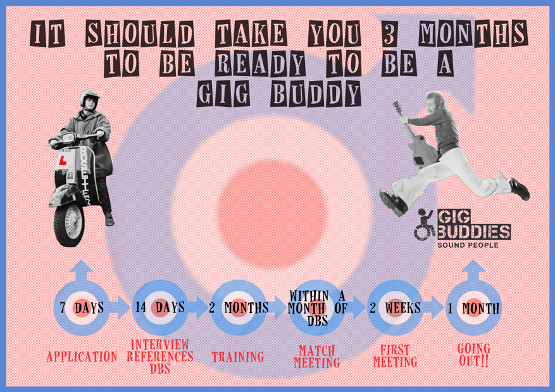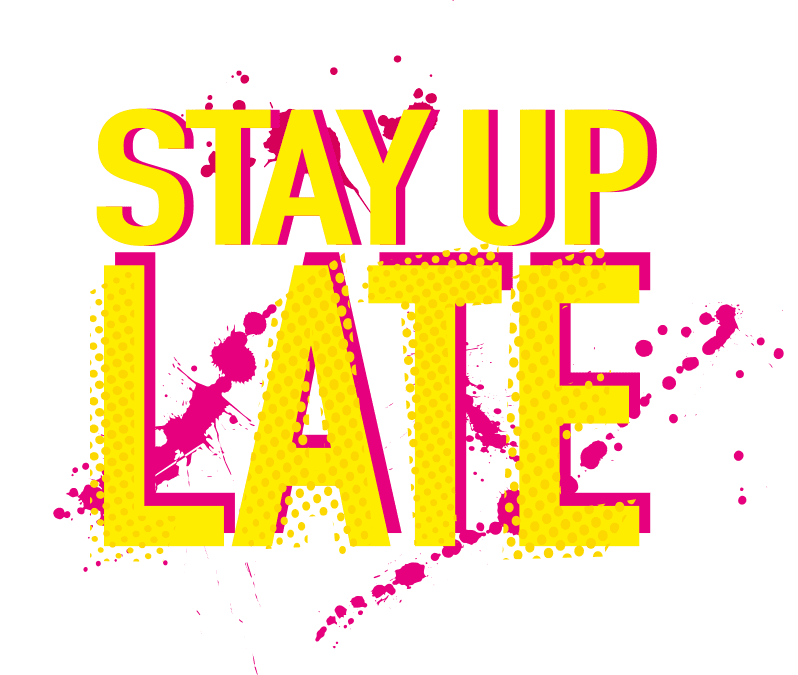
Recruiting volunteers through lockdown
Recruiting volunteers through lockdown
Like many small charities we rely heavily on our volunteers to deliver our work and for us the bulk of our work is about supporting people with learning disabilities to Stay Up Late and go to gigs. Not the easiest thing to sell to new volunteers when there’s a lockdown going on.
However, our work isn’t about going out to gigs at all, it’s about friendship, connection and community and the isolation brought about by the pandemic obviously made this even more important than ever.
But it did get us thinking how could we recruit new volunteers when some of our usual methods were no longer possible (such as hanging out at the back of gigs and grabbing punters as they left).
Thanks to some funding from the government we were able to set about developing a community engagement project, part of which was to find ways to recruit new volunteers and also increase the diversity of people involved in our work.
These are the steps we took.
1. We simplified everything
When you live with something for a long time you don’t notice it (like that smell coming from your kitchen bin) so it was a fresh pair of eyes that enabled us to see that our volunteer application form was far too long. We need to find out all the information we ask for but we realised we didn’t need to ask it all at the first encounter with us. That could be putting lots of good people off.
So we drastically trimmed our application form and make it more of an ‘Expression of Interest’ form and put all the questions we’d deleted in the interview questions sheet instead.
This also meant we were better able to respect peoples’ confidentiality when asking about any criminal convictions.
2. We made sure we were as responsive as possible
I was walking up on the downs one evening and I bumped into an old colleague who was tending a flock of sheep as a voluntary job. In the day they work at our local volunteer centre and she commented to me what a great reputation our team have for responding to new enquiries. That was great to hear and you never know what you can learn from taking a walk on the hills of an evening.
3. We don’t ‘need’ you
– (we re-framed our message to new volunteers)
It’s very tempting to use the old Lord Kitchener poster saying ‘we need you’. The problem is that this has become a well-worn cliché but also let’s not forget the awful fate that met many of the people that responded to that original poster.
Instead of saying ‘we need you’ we explained it as a volunteer opportunity. Something that we’d both benefit from in a variety of different ways. Lord Kitchener was given the boot, who needs him?
4. We learned from our existing volunteers?
We thought about what had worked in the past and also engaged with our existing volunteers. We came up with ways in which we could support them to be good buddies even while they couldn’t meet up and shared those stories to give other people ideas for what they could try.
5. We demonstrated the diversity of our volunteering opportunities
We also thought about how volunteers had come to us previously and thought widely about any barriers that may be present, regardless of the pandemic. We then made sure that our messaging was visual and showed that Gig Buddies is not just about gigs, it’s about walks, cups of tea, bowling, raving – whatever your gig is. And so we came up with the strapline ‘What’s Your Gig?’
We then created a series of leaflets showing different buddies dreaming of what they’re looking forward to doing when restrictions were lifted.
6. We made the sign-up process clear
We also wanted to make it really clear to new volunteers how long the process would take. The reality is it’ll take 3 months to get someone matched and so we wanted to be clear about that from the outset and produced this infographic.

Beyond that though we’ve been careful to keep the communication going through the application and checking processes so as to build the relationship and increase our chances of retaining people.
7. We made our adverts prominent
And thought about getting the word out in as many ways as possible.
We also set about talking to our local volunteer centres who were advertising our opportunities and helped them to develop their processes (for example by making sure that ‘people with learning disabilities’ was available as an option for people to tick).
8. We asked volunteers to help us tell their stories
They also supported us by doing shout-outs via social media and used quotes from existing volunteers to help us tell our story, as well as our ‘Pyramid of Gigs’ infographic which helped people to see how they can still have an impact as a volunteer through lockdown restrictions.

Then of course we get stories out through local and regional news and making extensive use of our social media channels.
9. Building on volunteering as an opportunity
We built on volunteering with us as an opportunity and created a record of skills gained from volunteering for student services, made connections with local businesses and promoted our work as way for them to deliver social responsibility in a fun way. (As a charity with no premised that need painting or gardens that need weeding it’s always nice to have something that we can sell to their staff like this).
We then reached out to organisations, faith groups and similar networks as a way of us reaching more people from the Global Majority (or ethnic communities). As well as places like record shops and venues.
10. Getting word of mouth going.
Finally we asked our volunteers to help us spread the word, talking to their friends and networks. Existing volunteers are the best champions of what we do and why we do it after all!
Did it work?
After trying all these steps we wanted to reflect on what had changed as a result, had any of it worked?
This is what we found out:
- By working with the volunteer centre we were able to highlight the different experiences and skills of working with people with learning disabilities and autistic people so they could create a new category on their sign-up forms online. (Before it was just ‘disability’).
As well as raising awareness of this group of people as a community we jumped to second in their searches!
- Interest from new volunteers increased (we’ve recruited 45 in the past 6 months) and we’ve continued to process and train new volunteers throughout lockdown.
This also meant re-writing our training course and creating an online element as pre-training work.
- We raised the profile of all of our work through new connections with businesses and organisations and kept existing partnerships ‘live’ even when we couldn’t get out.
- We received really positive feedback from the volunteer centre as an example of good practice with recruitment and retention of volunteers. They also complimented our team on their responsiveness, and the feedback from volunteers has been great too about our new online form.
Of course we’re not going to sit back because there is more that we want to do and we’ll be concentrating on developing our volunteers as a community in their own right and looking at ways in which they can connect with each other to provide peer support or even just gig and record recommendations.
We’re also using what we’ve learned to recruit new volunteers for our new Sports Buddies project.
We’d also like to say a massive thank you to Jenny Moore who led on this piece of work, it’s been really helpful for us and to share with all the other Gig Buddies projects. We hope you find some of this helpful for you too and we’d love to hear anything you’ve tried that’s worked. Feel free to post in the comments.








